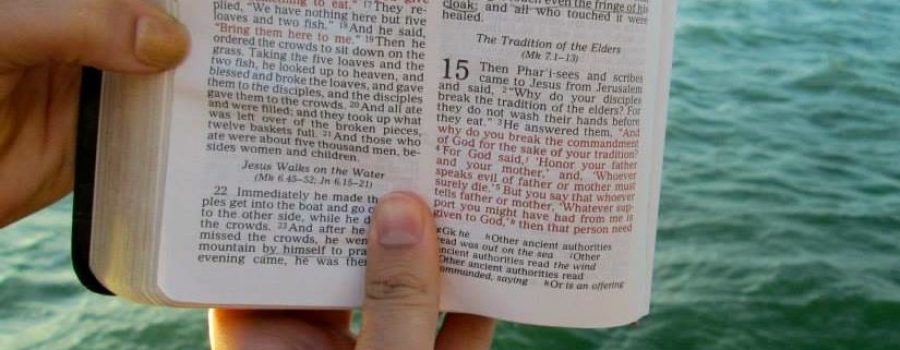Matt 14: 22-33
Immediately Jesus made the disciples get into the boat and go on ahead to the other side, while he dismissed the crowds. And after he had dismissed the crowds, he went up the mountain by himself to pray. When evening came, he was there alone, but by this time the boat, battered by the waves, was far from the land, for the wind was against them. And early in the morning he came walking toward them on the sea. But when the disciples saw him walking on the sea, they were terrified, saying, “It is a ghost!” And they cried out in fear. But immediately Jesus spoke to them and said, “Take heart, it is I; do not be afraid.”
Peter answered him, “Lord, if it is you, command me to come to you on the water.” He said, “Come.” So Peter got out of the boat, started walking on the water, and came toward Jesus. But when he noticed the strong wind, he became frightened, and beginning to sink, he cried out, “Lord, save me!” Jesus immediately reached out his hand and caught him, saying to him, “You of little faith, why did you doubt?” When they got into the boat, the wind ceased. And those in the boat worshiped him, saying, “Truly you are the Son of God.”
***
There is a Bible story I love. It goes a lot like the story I just read. There’s a boat full of disciples. There’s a storm that comes up from nowhere, tossing them about, making them fear for their lives. And there’s Jesus, our savior, our anchor, and he calms the storm for them. He stills the waves and silences the winds, and the world gets safe again.
Jesus calms the storm, and the world gets safe again.
I imagine I’m not the only one who loves that story.
But that story is not this story.
I thought it was. For the first 24 years of my life, I thought this story was about Jesus calming the storm. I just sort of smushed the two stories together in my head, since they were so similar. If you would have asked me to tell the story about Jesus walking on water (and not let me look at a Bible), I would have said it went something like this—the disciples are in a boat and a storm comes. Jesus calms the storm and walks to them on the water, inviting Peter to walk out with him. Peter becomes afraid, and begins to sink, and then Jesus saves him.
I think I thought this because it made sense to me. If you are Jesus, and you can calm storms, why on earth wouldn’t you before getting on the water? Isn’t walking on still water enough of a miracle?
But Jesus doesn’t do that. Jesus walks through the storm. And when he invites Peter out of the boat, he invites Peter into the storm with him.
We get caught up in the miracle of this scripture—the water walking bit. But that’s not what freaks Peter out. The Bible doesn’t say, Peter looked down and saw fish under his feet and started to panic—no, the Bible says he only got frightened when he noticed the strong winds. It was the storm that scared Peter—the storm that made him not so sure the miracle would last. The storm that made him falter, made his faith waver, started him sinking.
I don’t blame him. A storm is scary enough when you’re still in the boat, even if you’re a good sailor, even if you’ve been through storms before. But to leave the boat—to have nothing to protect you, nothing to hold onto, no ropes or oars, nothing that you can control or manipulate to keep you safe—that’s a whole different level of frightening. Peter may be in the middle of a miracle, but it’s one that’s left him entirely vulnerable. I don’t blame him one bit for panicking. I don’t blame him one bit for being afraid.
Storms are scary, even with Jesus by your side.
I told you all a story, back during Eastertide, about my friend Lynne. I don’t know if you’ll remember, but Lynne is a friend of mine from seminary. She’s about my mom’s age; she spent her first career as a schoolteacher, while raising her three daughters. Lynne was kind of our seminary mom; she’s the one who made us dinner every Tuesday night, just so we’d get a chance at a family meal. Lynne is warm and friendly and practical. Generous too—I once told her I liked her sweater and she lent it to me for a whole summer.
For the last few years, Lynne’s been serving as the Associate Pastor of Christian Formation at Westminster Presbyterian Church in Charlottesville, VA. Which means my warm, motherly, salt-of-the-earth friend spent this weekend holding the line against a gathering of white supremacists who descended on her city.
Charlottesville is about two hours from where I grew up, and about an hour from where I went to seminary. It’s a beautiful little city. Lynne isn’t my only friend in Charlottesville this weekend—some are organizing prayer vigils, some are serving as crisis chaplains at the UVA hospital, some are engaged in active counter-protesting. Most are part of a clergy collective of pastors, imams, and rabbis who have been planning ways to show up for love in the face of overwhelming, prejudicial, gleeful hate. Armed with nothing more than stoles and collars and fierce, determined faith, these folks have linked arms against mobs of men with semi-automatics and no goal but to intimidate, harass, and harm anyone who disagrees with how they think the world should work.
I want to be very clear about this: the people who came to Charlottesville for the “Unite the Right” rally are not political conservatives; they are not right-wing Republicans expressing their political views. They are not anywhere on the spectrum of acceptable political diversity. They are white supremacists. They are neo-Nazis. They are displaying their hatred of racial and religious difference with torches and swastikas. And they are so bold that they do not feel the need to wear hoods to hide their faces.
And they are scary. They should be scary. If we are not scared of a world in which hatred has support groups, we are not paying attention.
But being scared does not excuse us from taking action.
I have heard from some quarters this week that the best response to displays of hatred and harassment is to ignore them; to not give them the benefit of publicity; to keep ourselves safe at all costs.
In other words, to hope that if we close our eyes, it’ll just go away.
In other words, to stay in the boat.
But Jesus does not tell us to stay in the boat. Jesus calls us into the storm.
I have been proud this weekend; proud to see my friends, my colleagues, put themselves in the middle of a brutal—and for at least one young woman—fatal storm because their faith in God demanded it. Proud to see people who look like me—who wear robes like mine, who carry Bibles like mine, who stand in pulpits like mine—proud to see them put their bodies on the line for God’s justice, for a chance to show the world that religion is not about destroying others; that some of us really mean it when we say we love our neighbors as ourselves. As a church, we’re not always so great at this part. But this weekend, the church showed up in Charlottesville. Even in rough water, they have stood tall.
It makes me proud, to look at those pictures. But then I look at the other pictures coming out of Charlottesville. The ones full of neo-Nazis carrying torches around the rotunda on UVA campus. The ones waving swastikas on the street.
And the problem is, these people look like me too. They look like my family, friends, neighbors. They look like guys I know, guys I went to school with, guys I grew up with. Some of them may very well be. And that throws cold water on all my pride. It reminds me that, as someone with her roots in white European Christianity, this storm is my responsibility too. And so I am called to use my voice, wherever and however I can, to speak against racial and religious hatred, especially when it comes from people who look like me, people I am implicitly prejudiced to trust, or relate to, or excuse.
At least one of them was our neighbor. James Fields, who made the choice yesterday to drive a speeding car into a group of counter-protestors, murdering Heather Heyer and injuring a dozen others, grew up in Florence. He graduated from Randall K. Cooper High School in Union. He lived and ate and shopped where many of us live and eat and shop. And he did it all with enough hate building in his heart that yesterday, driving over living human beings seemed like a good idea to him. This is not a remote problem, not a “deep south” problem, not a “backwaters” problem. This is our problem.
As white Christians, this is a storm much of our own making, but it can also be a storm of our unmaking, if we are willing to stand in the waves and shout God’s love as loudly as we can against winds of hate.
Like Peter, I too often fail at this calling. I falter. I let things slide. I let fear get in the way. I let my own prejudices blind me. I let the disapproval or scorn of others scare me. And I start to sink. Until I remember that it is only Jesus who can give me the courage to do his work.
It is unlikely that you will face marching neo-Nazis in your life this week. I pray fervently that you do not. But many of you are walking into your own storms; storms of anxiety or change; storms of sickness or busy-ness; storms of being overwhelmed with everything that works against God’s will for the world. I want you to know that you are not alone in the storm. You do not have to tread water on your own. You do not have to pull off your own miracle.
Jesus is with you, right there, in the storm. Jesus has called you into it and Jesus will support you through it. Jesus is right there, hand outstretched, ready to pull you up. Jesus chooses to walk through the storm to get to us. He doesn’t wait until the waters are calm. He comes to us now.
My first instinct when being tossed in choppy waters is to hold tight to the boat, to what is familiar, to what I know has kept me safe in the past. But Jesus invites us to step out of our human-built boats and into the raging storm of the Galilean Sea. We cannot simply cower in the boat and wait for Jesus to snap his fingers and make everything peaceful; we are called to walk with Christ in the crashing waves. Peter began to sink, and sometimes so will we. If we know anything from history, it is that humans fail and fall in so many ways. But Jesus caught Peter, and that is the God we trust in, whose hand is outstretched as we do our best to pick a path amidst the wind and waves.
It is far easier to stay in the boat, to put on the blinders and hope (even pray!) that the storm dies down soon so we can get back to shore and get on with our lives. Easier to shut our ears to the cries of our siblings of different colors and creeds, who live with this kind of fear every day. Easy to say words like “unity” and “tolerance” and really only mean “keep quiet.”
But if we do so, we ignore the miracle that Jesus is inviting us into: to realize that we are strong enough not only to survive the storm, but to walk right through it.
This is faith: to be unafraid to step out of the boat, to walk in the storm, and to stretch out our hands to those who have no choice but to live in the storm every day, and to take other hands as they are offered to us.
We pray for the still waters, but we must also be willing to step out of the boat and into the waves, however wet and cold and seasick we may be, since it is in those waves that we meet Christ.
Take heart.
And get out there.
Amen.
*photo by Rev. Emily Rhodes Hunter




3 Comments
Leave your reply.